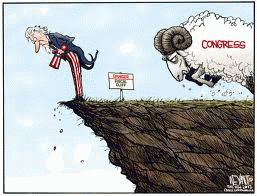The "fiscal cliff" is another hoax designed to shift the attention of policymakers, the media, and the attentive public, if any, from huge problems to small ones.
The fiscal cliff is automatic spending cuts and tax increases in order to reduce the deficit by an insignificant amount over 10 years if Congress takes no action itself to cut spending and to raise taxes. In other words, the "fiscal cliff" is going to happen either way.
The problem from the standpoint of conventional economics with the fiscal cliff is that it amounts to a double-barrel dose of austerity delivered to a faltering and recessionary economy. Ever since John Maynard Keynes, most economists have understood that austerity is not the answer to recession or depression.
Regardless, the fiscal cliff is about small numbers compared to the Derivatives Tsunami or to bond market and dollar market bubbles.
The fiscal cliff requires that the federal government cut spending by $1.3 trillion over 10 years. The Guardian reports that means the federal deficit has to be reduced about $109 billion per year, or 3 percent of the current budget. More simply, just divide $1.3 trillion by 10 and it comes to $130 billion per year. This can be done by simply taking a three month vacation each year from Washington's wars.
The Derivatives Tsunami and the bond and dollar bubbles are of a different magnitude. Last June 5 in "Collapse At Hand," I pointed out that according to the Office of the Comptroller of the Currency's fourth quarter report for 2011, about 95% of the $230 trillion in US derivative exposure was held by four US financial institutions: JP Morgan Chase Bank, Bank of America, Citibank, and Goldman Sachs.
Prior to financial deregulation, essentially the repeal of the Glass-Steagall Act and the non-regulation of derivatives -- a joint achievement of the Clinton administration and the Republican Party -- Chase, Bank of America, and Citibank were commercial banks that took depositors' deposits and made loans to businesses and consumers and purchased Treasury bonds with any extra reserves.
With the repeal of Glass-Steagall these honest commercial banks became gambling casinos, like the investment bank, Goldman Sachs, betting not only their own money but also depositors money on uncovered bets on interest rates, currency exchange rates, mortgages, and prices of commodities and equities.
These bets soon exceeded many times not only US GDP but world GDP. Indeed, the gambling bets of JP Morgan Chase Bank alone are equal to world Gross Domestic Product.
According to the first quarter 2012 report from the Comptroller of the Currency, the total derivative exposure of US banks has fallen insignificantly from the previous quarter to $227 trillion. The exposure of the four US banks accounts for almost of all of the exposure and is many multiples of their assets or of their risk capital.
The Derivatives Tsunami is the result of the handful of fools and corrupt public officials who deregulated the US financial system. Today merely four US banks have derivative exposure equal to 3.3 times world Gross Domestic Product. When I was a US Treasury official, such a possibility would have been considered beyond science fiction.
Hopefully, much of the derivative exposure somehow nets out so that the net exposure, while still larger than many countries' GDPs, is not in the hundreds of trillions of dollars. Still, the situation is so worrying to the Federal Reserve that after announcing a third round of quantitative easing, that is, printing money to buy bonds -- both US Treasuries and the banks' bad assets -- the Fed has just announced that it is doubling its QE 3 purchases.
In other words, the entire economic policy of the United States is dedicated to saving four banks that are too large to fail. The banks are too large to fail only because deregulation permitted financial concentration, as if the Anti-Trust Act did not exist.
The purpose of QE is to keep the prices of debt, which supports the banks' bets, high. The Federal Reserve claims that the purpose of its massive monetization of debt is to help the economy with low interest rates and increased home sales. But the Fed's policy is hurting the economy by depriving savers, especially the retired, of interest income, forcing them to draw down their savings. Real interest rates paid on CDs, money market funds, and bonds are lower than the rate of inflation.
Moreover, the money that the Fed is creating in order to bail out the four banks is making holders of dollars, both at home and abroad, nervous. If investors desert the dollar and its exchange value falls, the price of the financial instruments that the Fed's purchases are supporting will also fall, and interest rates will rise. The only way the Fed could support the dollar would be to raise interest rates. In that event, bond holders would be wiped out, and the interest charges on the government's debt would explode.
With such a catastrophe following the previous stock and real estate collapses, the remains of people's wealth would be wiped out. Investors have been deserting equities for "safe" US Treasuries. This is why the Fed can keep bond prices so high that the real interest rate is negative.
(Note: You can view every article as one long page if you sign up as an Advocate Member, or higher).






